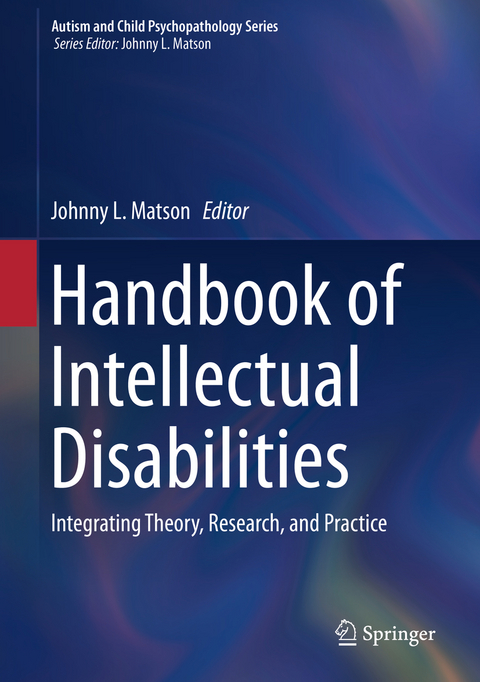
Handbook of Intellectual Disabilities
Springer International Publishing (Verlag)
978-3-030-20842-4 (ISBN)
Topics featured in this handbook include:
- Informed consent and the enablement of persons with ID.
- The responsible use of restraint and seclusion as a protective measure.
- Vocational training and job preparation programs that assist individuals with ID.
- Psychological and educational approaches to the treatment of aggression and tantrums.
- Emerging technologies that support learning for students with ID.
- Key sexuality and relationship issues that are faced by individuals with ID.
- Effective approaches to weight management for individuals with intellectual and developmental disabilities.
Johnny L. Matson, Ph.D., is Professor and Distinguished Research Master in the Department of Psychology at Louisiana State University, Baton Rouge, LA, U.S.A. He has also previously held a professorship in psychiatry and clinical psychology at the University of Pittsburgh. He is the author of more than 800 publications including 41 books. He served as the Founding Editor-in-Chief for the journals Research in Developmental Disabilities (Elsevier) and Research in Autism Spectrum Disorders (Elsevier) and currently serves as the Editor-in-Chief for the Review Journal of Autism and Developmental Disorders (Springer).
Section 1. Foundations.- Chapter 1. History of Intellectual Disabilities.- Chapter 2. Theories of Intelligence.- Chapter 3. Definition and Diagnosis.- Chapter 4. Problem Solving and Working Memory in People with Intellectual Disabilities: An Historical Perspective.- Section 2. Philosophy of Care.- Chapter 5. Philosophy of Care.- Chapter 6. Quality of Life.- Chapter 7. Service Delivery Models.- Chapter 8. Comorbidity and Intellectual Disability.- Section 3. Parent/Professional Issues.- Chapter 9. Parent and Professional Organizations.- Chapter 10. Staff Training and Supervision.- Chapter 11. Multidisciplinary Teams.- Chapter 12. Reports and How to Write Them.- Chapter 13. Agencies and Professions in the Provision of Care.- Section 4. Client Protections and Innovations.- Chapter 14. Informed Consent.- Chapter 15. Research Priorities and Protection.- Chapter 16. Restraint and Seclusion.- Chapter 17. Monitoring Drug Side-effects.- Section 5. Causes and Risk Factors of Intellectual Disabilities.- Chapter 18. The Effects of Genetic Disorders on Language.- Chapter 19. Social and Psychological Stressors.- Chapter 20. Environmental Chemical Exposures and Intellectual Disability in Children.- Section 6. Assessment.- Chapter 21. The Role of Intelligence Tests in the Assessment of Intellectual Disabilities.- Chapter 22. Early Assessment and Tests for Adaptive Behavior.- Chapter 23. Tests for Dual Diagnosis.- Chapter 24. Assessing Challenging Behaviors.- Chapter 25. Vocational Skills and their Assessment.- Chapter 26. Neuropsychology.- Section 7. General Issues in Treatment.- Chapter 27. Evidence Based Treatment.- Chapter 28. Pseudoscientific Therapies for Autism Spectrum Disorder.- Chapter 29. Care Giver Treatment Choices.- Section 8. Treatment ofProblem Behaviors.- Chapter 30. Behavioral Strategies to Address Noncompliance.- Chapter 31. Stereotypy and Repetitive Behaviors.- Chapter 32. Self-Injurious Behavior.- Chapter 33. Pica.- Chapter 34. Feeding Disorders.- Chapter 35. Psychological and Educational Approaches to the Treatment of Aggression and Tantrums in People with Intellectual Disabilities.- Chapter 36. Use of Medications in the Treatment of Aggressive Behavior.- Section 9. Skill Building and Intellectual Disabilities.- Chapter 37. Social Skills.- Chapter 38. Coping Skills Training in Individuals with Intellectual Disability.- Chapter 39. Early Intervention.- Chapter 40. Parenting Support .- Chapter 41. Self-Help Skills.- Chapter 42. Curriculums.- Chapter 43. Emerging Technology for Students with Intellectual Disability.- Section 10. Treatment for Dual Diagnosis.- Chapter 44. Anxiety and Phobias.- Chapter 45. Depression.- Chapter 46. Psychosis.- Chapter 47. Evidence-Based Treatments for Comorbid Autism Spectrum Disorders.- Chapter 48. Attention-Deficit/Hyperactivity Disorder (ADHD).- Chapter 49. Developmental Coordination Disorder.- Chapter 50. Substance Use Disorders.- Chapter 51. Dementia and Intellectual Disability: Prevalence, Assessment and Post-Diagnostic Support.- Section 11. Health and Social Behaviors.- Chapter 52. Issues of Sexuality and Relationships.- Chapter 53. Pain.- Chapter 54. Nutrition.- Chapter 55. Diabetes.- Chapter 56. Factors in Weight Management: A Research Story.- Chapter 57. Incontinence.
| Erscheinungsdatum | 21.09.2019 |
|---|---|
| Reihe/Serie | Autism and Child Psychopathology Series |
| Zusatzinfo | XXI, 1133 p. 62 illus., 27 illus. in color. |
| Verlagsort | Cham |
| Sprache | englisch |
| Maße | 178 x 254 mm |
| Gewicht | 2196 g |
| Themenwelt | Geisteswissenschaften ► Psychologie ► Entwicklungspsychologie |
| Geisteswissenschaften ► Psychologie ► Pädagogische Psychologie | |
| Medizin / Pharmazie ► Medizinische Fachgebiete ► Pädiatrie | |
| Medizin / Pharmazie ► Medizinische Fachgebiete ► Psychiatrie / Psychotherapie | |
| Sozialwissenschaften ► Pädagogik ► Sozialpädagogik | |
| Schlagworte | Aggression and intellectual disability • Assessment and treatment of intellectual disabilit • Assessment and treatment of intellectual disabilities • Autism spectrum disorder (ASD) and ID • Comorbidities and intellectual disorders • Compliance and ID • Down Syndrome and intellectual disability • Dual diagnosis and intellectual disabilities • Environmental toxins and ID • Epilepsy, seizures, and intellectual disabilities • Feeding and intellectual disabilities • Functional assessment of intellectual disabilities • Genetics and intellectual disability • Informed consent and intellectual disability • Intellectual disabilities and pica • Legal issues and intellectual disability • Report writing and intellectual disabilities • Restraint, seclusion and intellectual disability • Self-injurious behavior (SIB) and intellectual dis • Self-injurious behavior (SIB) and intellectual disorders • Substance abuse and intellectual disabilities • Vocational training and ID |
| ISBN-10 | 3-030-20842-7 / 3030208427 |
| ISBN-13 | 978-3-030-20842-4 / 9783030208424 |
| Zustand | Neuware |
| Haben Sie eine Frage zum Produkt? |
aus dem Bereich


